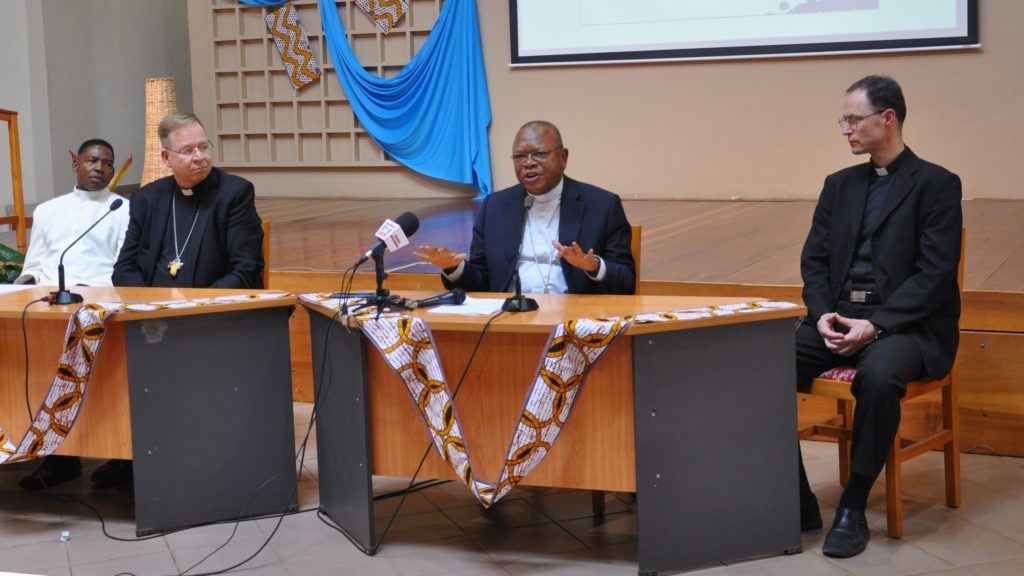An African cardinal who recently led the continent’s bishops in rejecting blessings for same-sex couples has now lashed out at the timing of the Vatican document that opened the door to such a move, calling it “damaging” to the synodal process convened by Pope Francis.
Cardinal Fridolin Ambongo of Kinshasa in the Democratic Republic of Congo said that because the Dec. 18 release of Fiducia Supplicans, which authorized non-liturgical blessings of the persons involved in same-sex relationships, came between the two Synods of Bishops on Synodality, it created the misleading notion that the document was the fruit of synodal discussions.
“The timing, the moment when this document was published, was damaging for the synodal process,” Ambongo said Jan. 25.
The 64-year-old Ambongo, who also serves as president of the Symposium of Episcopal Conferences of Africa and Madagascar (SECAM), said the timing of the document’s release “brought discredit to the synod, to synodality.”
“In the first session, the synod dealt with all these issues, but the synod did not decide,” Ambongo said. “So the publication of this document, between the two sessions of the synod, was seen by most people as if it was the fruit of the synod, when it had nothing to do with the synod.”
Ambongo’s comments came in a press conference during a Jan. 24-26 joint meeting between representatives of SECAM and the Council of European Bishops’ Conferences (CCEE) held in Nairobi, Kenya.
Ambongo said that many people already saw the synod’s first session as at least indirectly signifying “approval of homosexual couples and homosexuality,” which, he argued, goes against both African culture and the fundamental teachings of the Catholic faith.
Since it appeared, Fiducia Supplicans has generated widely contrasting reactions. Catholic bishops in parts of western Europe, for instance, welcomed the decision, describing it as a milestone in the effort to include LGBTQ+ believers in the life of the Church.
“I am very happy that this text will hopefully put an end to some aggressive rejection, and that it will become clear that blessing people is truly Catholic,” said Bishop Peter Kohlgraf of Mainz, reflecting the general stance of German bishops.
In Africa, however, resistance to offering blessings to same-sex couples has been compact and overwhelming. In a collective statement issued Jan. 11, members of SCAM, led by Ambongo, summarily rejected the idea.
“We African bishops do not consider it appropriate for Africa to bless homosexual unions or same-sex couples, because this would cause confusion,” they said.
The bottom line, according to the statement, is that there will be “no blessings for same-sex couples in the African churches.”
At the time, Ambongo argued that same sex relationships are against both the laws of nature and African cultures and traditions, even as he emphasized the need to not discriminate people based on their sexuality.
“The African bishops’ conferences emphasize that people with homosexual tendencies must be treated with respect and dignity, while reminding them that unions of persons of the same-sex are contrary to the will of God and therefore cannot receive the blessing of the Church,” the statement said.
In a recent interview with the Italian newspaper La Stampa, Pope Francis said that in general opposition to Fiducia Supplicans has come from “small ideological groups,” while allowing that Africa is a “special case.”
“For them, homosexuality is something ‘bad’ from a cultural point of view, they don’t tolerate it,” the pope said.
“But in general, I trust that gradually everyone will be reassured by the spirit of the declaration Fiducia Supplicans by the Dicastery for the Doctrine of the Faith: it aims to include, not divide. It invites us to welcome people and to entrust them, as we entrust ourselves, to God,” he said.
Ambongo said in his Jan. 25 press conference in Nairobi that the Jan. 11 statement from SECAM rejecting the Vatican directive has calmed anxious Christians in Africa.
“I am happy to note that since the publication of my message on Jan. 11, calm has returned to Africa and communion has returned with Pope Francis,” he said.
During the joint meeting with their European counterparts, several bishops from Africa made it clear that, in their view, the synodal process should not allow the universal Church to modify doctrine in order to “create room for all,” in what most observers took as another reference to the controversy over same-sex relationships.
Father Rafael Simbine, SECAM Secretary General, said, “Our Lord and Master Jesus Christ extends his invitation for discipleship to all. However, all who respond to become his disciples are to follow him not on their own terms but on the Lord’s terms and standards. Jesus’s call to discipleship involves the challenge to ongoing conversion of turning away from a sinful life to embrace a life of holiness.”
African prelates also insisted that the synodal process should see the inclusion of women and youth in the journey of faith.
“The future of the Church lies in the hands of the youth, and for effective participation of the youth in the Church, their programs and activities must be made priorities,” SECAM members said.
“Women hold the Church together; they are the majority. They are the backbone of the Church. Women are a gift to the Church,” the bishops added.

